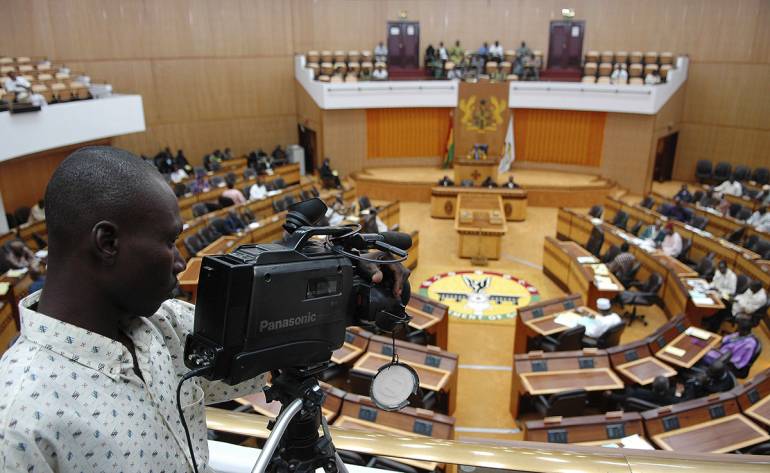Democratic Decentralization and Sustainable Development

The Parliament in Accra, June 2006. Photo: Jonathan Ernst, World Bank.
Democratic Decentralization, Local Governance and Sustainable Development: Ghana’s Experiences in Three Decades
Ghana is often labelled as one of the few African countries with progressive institutional reforms directed towards good governance, participatory and sustainable local development. After about two decades of postcolonial experiences with series of political and economic instability in Africa, Ghana was one of the first African countries to embrace and operationalize the structural adjustment reforms in the 1980s and subsequently rolled its democratic decentralization plan in 1988. After passing the Local government Act 1988 (PNDC Law 207), Ghana successfully held its local government elections in late 1988 and early 1989 with about 60 percent voter turn-out rate. This process initiated the institutionalization of democratic decentralization and local governance during the structural adjustment period.
Institutional Partners:
Nordic Africa Institute (NAI), Uppsala, Sweden
College of Humanities and Social Sciences, Kwame Nkrumah University of Science and Technology (KNUST), Kumasi, Ghan
Starting with 110 districts in 1988 to receive political authority with deliberative, executive and legislative functions, the number of districts has grown significantly over the past three decades reaching 254 in 2018. Fiscal and institutional reforms have also occurred during the period as part of the processes for promoting participatory, responsive and downwardly accountable governance and sustainable local development in the country. After three decades of implementing democratic decentralization since 1988, it is necessary to review, appraise and verify progress and prospects through Capacity, Authority, Autonomy, Accountability, Responsiveness and Sustainability (CAAARS) analytical framework for planning and policy-making within the context of subsidiarity science. This is necessary considering that over the years, Ghana’s institutional reforms often present relevant lessons and examples for many African countries to consider and adopt where appropriate.
- How have democratic decentralization and local governance reforms deepened or subverted responsive and accountable local representation and delivery of public goods and services since 1988?
- In what ways have decentralization and local government reforms strengthened grassroots participation, bottom-up development planning and implementation processes in the last three decades?
- How has decentralized governance promoted rural-urban spatial equity, poverty reduction and rural development?
- To what extent have decentralization reforms over the past three decades strengthened human and financial resource capacity and autonomy of subnational structures to deliver accountable, responsive and sustainable local governance and development?
- How has democratic local governance reforms promoted gender equal representation and women empowerment for poverty reduction and local development?
- What legal and institutional reforms are necessary to strengthen participatory, integrated and sustainable local development in Ghana and beyond?
Further Information
Contact Dr. Prince Osei-Wusu Adjei, Senior Researcher, NAI, prince.adjei@nai.uu.se, for more information on this workshop and paper submission.
